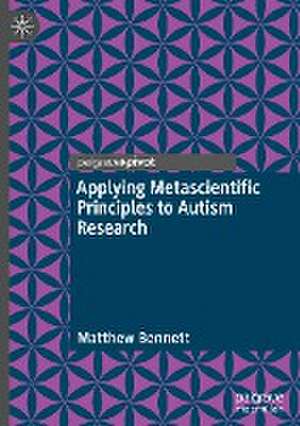Applying Metascientific Principles to Autism Research
Autor Matthew Bennetten Limba Engleză Hardback – 4 mar 2023
Preț: 352.25 lei
Nou
Puncte Express: 528
Preț estimativ în valută:
67.40€ • 70.37$ • 55.78£
67.40€ • 70.37$ • 55.78£
Carte tipărită la comandă
Livrare economică 05-19 aprilie
Preluare comenzi: 021 569.72.76
Specificații
ISBN-13: 9789811992391
ISBN-10: 9811992398
Pagini: 140
Ilustrații: XXV, 140 p.
Dimensiuni: 148 x 210 x 16 mm
Greutate: 0.35 kg
Ediția:1st ed. 2023
Editura: Springer Nature Singapore
Colecția Palgrave Macmillan
Locul publicării:Singapore, Singapore
ISBN-10: 9811992398
Pagini: 140
Ilustrații: XXV, 140 p.
Dimensiuni: 148 x 210 x 16 mm
Greutate: 0.35 kg
Ediția:1st ed. 2023
Editura: Springer Nature Singapore
Colecția Palgrave Macmillan
Locul publicării:Singapore, Singapore
Cuprins
Chapter One – Introduction.-Chapter Two – Preventing the certification and proliferation of specious research.- Chapter Three – Addressing the reproducibility crisis.- Chapter Four – Evaluating and improving the peer review process.- Chapter Five – Reducing questionable research practices.- Chapter Six – Creating studies that are respectful of autistic participants.
Notă biografică
Dr Matthew Bennett is an independent researcher who has spent more than ten years researching the autism spectrum. He has published six books about the autism spectrum.
Textul de pe ultima copertă
This book presents several metascientific strategies and explains how they can be used to improve research about the autism spectrum. It begins with an introduction to the field of metascience and the benefits that it brings to academic disciplines and society. It then outlines recommendations that researchers can adopt so that they do not incorporate specious autism research from predatory publishers into their research activities. An introduction to reproducibility and strategies that can improve the reproducibility of autism research are then outlined. This is followed by chapters about improving the peer review process and reducing the prospect of questionable research practices from occurring. This book concludes with a chapter about strategies that researchers can use to improve the participation of autistics in research. Such knowledge will equip academics, regardless of their experience, with the skills and expertise they need to produce high-quality and inclusive research about the autism spectrum.
Dr Matthew Bennett is an independent researcher who has spent more than ten years researching the autism spectrum. He has published six books about the autism spectrum.
Caracteristici
Challenges current conventions about how to competently perform research about the autism spectrum Helps readers understand some of the weaknesses inherent to the research techniques currently used to study autism Offers practical ideas for academics to improve the quality of their research about the autism spectrum
